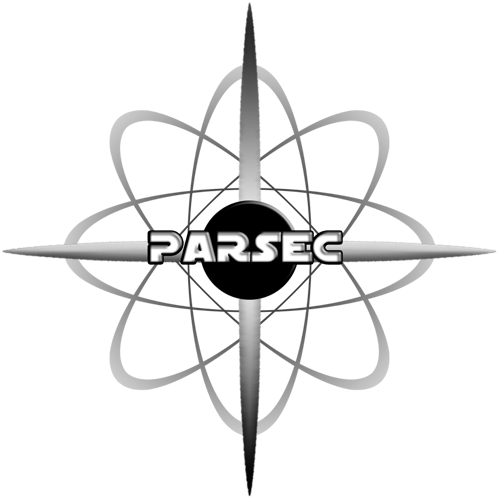For over three decades, Parsec has been the premier speculative fiction organization in Pittsburgh. It’s been granted 501c3 charitable status because of the broad educational component and the high number of volunteer hours. The Parsec mission is “to promote awareness of the richness of speculative fiction as literature, art and music; further general education in the sciences and arts, support contributions–both scientific and artistic–to society.”
- Confluence is the annual, three-day, science fiction conference in late July.
- Alpha, the SF/F/H Workshop for Young Writers is a twelve-day, residential workshop for teenagers 14 to 19 years old at UPG.
- The CMU student club Partners in Speculative Fiction co-hosts a lecture series with Parsec. Local and national authors share the stage for the public to enjoy free writing workshops and talks several times a year.
- The meeting group hosts free, open monthly club activities.
- Annually, the small press Parsec Ink publishes the Triangulation series and runs the Parsec Short Story Contest, a no-fee, genre contest with cash prizes ($200, $100, $50).
But Parsec is more than the sum of its parts, it’s a community. I’ve seen members meet and marry, help each other through rough medical issues, find each other jobs, new friends and living quarters, help with moves, co-author and critique each other’s work, jointly celebrate and mourn, grow up and grow old together.
Opportunities have been created for people to use this system we’ve built, and Triangulation is a prime example, since it was designed to rotate editorship among local writers as a learning experience. This year nearly twenty students joined the editorial team as slush readers. They were given access to the submissions system Submittable and could read stories as they came in, rank and comment on them. They quickly learned something that’s hard to believe until one experiences it firsthand. Most stories submitted anywhere are awful. What a boost that was to their self-esteem. They saw the same mistakes over and over. It’s hard to create those kinds of teachable moments. We had lively discussions about story technique and they learned quickly what not to do in their own writing. Of course, many of the hundreds of submissions were brilliant and those were analyzed, too. The students saw our procedures and contracts, how we raised the funds necessary and pulled together art, design, layout and advertising material. SFWA gave us a grant for this teaching experience. These students also will be sent copies of the anthology and run release parties in their areas, the full experience.
The 2019 theme was suggested by a CMU Metro21 grant to study light pollution in Pittsburgh. The phrase “Dark Skies” to astronomers is a way to put a positive spin on light pollution, which is the excessive artificial light at night that inhibits observation of stars. Light pollution can have serious environmental consequences for human health and wildlife, and wastes billions of dollars a year. 99 percent of the people in Europe and the US can’t experience a natural sky where they live because of skyglow, which is easily preventable, education being key. Shield lights so they don’t shine up into the sky, use lower wattage, lower temperature bulbs, set timers, dimmers or motion sensors or just turn the lights off when they aren’t needed.
Dark skies are what we should be seeing, skies full of stars. Triangulation has always benefited from authors interpreting the theme in whatever way they want, using artistic license to its fullest. Therefore, the stories are all thoughtful, creative interpretations of the theme. The hope is that this issue will spark interest in seeing dark skies, encourage authors to incorporate more realistic, scientific scenarios into their fiction and “storify” important issues to create a deep, lasting reader experience.
In this vein, Isaac Payne (former Alpha students and editorial assistant on the Dark Skies issue) will be editing the 2020 edition of Triangulation on the theme Extinction. His Kickstarter is up now to pay the authors 3 cents a word, a decent sum for a small press anthology. Won’t you consider helping? Deadline, Saturday, November 30th.
It takes a community.
